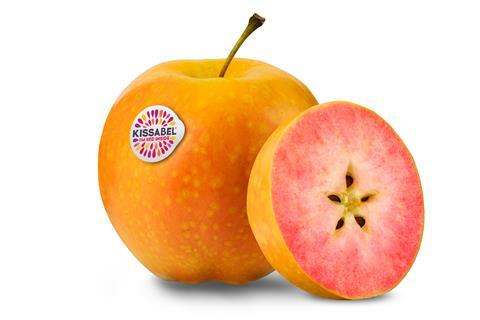The Australian campaign for Kissabel is set to continue until June to raise brand awareness, while efforts to expand the commercial window in Chile continue and South Africa prepares for the first tests in 2025
Australia, Chile and South Africa are paving the way for the growth of Kissabel apples from the Southern Hemisphere, according to the apple brand. Harvesting of the apples, whose flesh ranges in colour from pink to deep red, commenced between February and April in the South, marking a breakthrough in varietal research and marketing.

Southern Hemisphere partners in the Ifored programme, dedicated to the development of Kissabel apples, include Montague (Australia), Unifrutti (Chile), Moño Azul (Argentina), DuToit (South Africa) and Yummy Fruit (New Zealand).
“Kissabel is a global programme, and we are delighted to count on the expertise of top partners in the Southern Hemisphere,” said Emmanuel de Lapparent, manager of the Ifored programme. “Our red-flesh range is an exciting new development for the apple industry, and with each harvest we are making progress towards ever greater availability of top-quality fruit with an amazing appearance and delicious taste.”
Australia is the first country in the region to begin sales, with the season starting in March and lasting until early June. With the aim of building brand awareness and strong demand, Kissabel partner Montague set up a multi-channel marketing plan, including PR, in-store sampling, collaborations with influencers and partnerships with restaurants and bakeries, as well as tastings at The Orchard at Montague, the company’s retail outlet.
Kissabel also took part in the Melbourne International Flower and Garden Show, welcoming thousands of attendees to sample the apple. All these initiatives are intended to lay the foundation for an expected increase in volumes in the years to come.
Unifrutti in Chile equally recorded growth for Kissabel. This year, pilot orchards provided volumes for test shipments to Central and South America between mid-March and April. The goal is to widen the commercial window, including by evaluating different red-flesh varieties suited to the specific characteristics of the cultivation areas.
In South Africa, the DuToit Group is reportedly continuing to evaluate varieties, testing several in its apple orchards that are already on the market in other countries. The aim is to have the first quantities for a semi-commercial season by 2025. Meanwhile, the testing phase is also underway in Argentina and New Zealand.



